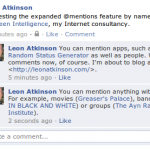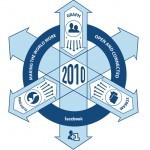Leon Atkinson's Blog, page 33
June 16, 2012
A Free Society Includes Freedom to Shun

An inflammatory KKK cartoon from The Fiery Cross that was used as evidence in the civil trial that followed the murder of Michael Donald. (Photo credit: Wikipedia)
CNN reports that the KKK in Georgia has been denied the request adopt a highway. The KKK are a vile organization that advocates initiating violence against people for inherent aspects such as skin color. I would never willingly have any association with a member of the KKK, and neither should anyone else. I don’t just mean I wouldn’t do business with a klansman. I don’t just mean I wouldn’t stop to help him change his tire. I mean I would offer no food if he were starving, nor any aid whatsoever if he were bleeding out on the side of the road.
In a free society, people are free to believe what they will. Likewise, in a free society, people are free to shun those they disapprove of. Unfortunately, we do not live in a free society.
The KKK is seeking help from the ACLU. There is a case to be made for protection under the first amendment. This is the tragedy of having a government: you are made to pay taxes so that the KKK can advertise their hate. People in the government claim ownership of the roads and offer equal treatment to the peaceful and the advocates of murder. If we were free to shun these people, I have no doubt they and their ideas would would be entombed in history.
It just makes me want to shout, in the immortal words of The Stains (AKA MDC): “No war! No KKK! No Facsist USA!”
If you’re interested in more ideas about how government itself enables evil, check out Jacob Spinney’s YouTube video The State Is Not Great: How Government Poisons Everything.
Related articles
 KKK Seeks Legal Help From ACLU in Road Fight(foxnews.com)
KKK Seeks Legal Help From ACLU in Road Fight(foxnews.com) KKK wants ACLU help to adopt highway(cnn.com)
KKK wants ACLU help to adopt highway(cnn.com)
December 17, 2011
Best Books I read in 2011
Here's a list of good books I read or listened to this year. Not all of them were published this year. If philosophical topics make you frown, skip to the programming books near the end.
Anarchy Evolution by Greg Graffin

 Greg Graffin is the lead singer of Punk band Bad Religion. He's also is a PhD zoologist who teaches at UCLA. This book is part autobiography, part manifesto. He alternates between telling stories about his childhood, including some stories about being a teenager in a legendary band when hardcore began. (For much more about the hardcore scene, see the 2nd edition of American Hardcore by Steven Blush, one of my favorite books).
Greg Graffin is the lead singer of Punk band Bad Religion. He's also is a PhD zoologist who teaches at UCLA. This book is part autobiography, part manifesto. He alternates between telling stories about his childhood, including some stories about being a teenager in a legendary band when hardcore began. (For much more about the hardcore scene, see the 2nd edition of American Hardcore by Steven Blush, one of my favorite books).
Like me, Graffin accepts the two big A ideas: anarchy and atheism. Keep this in context that I reject the modern hijacking of anarchist to mean thugs dealing random violence, which is similar to how the neighbor-lovers have tried to spoil selfish. (The meek call it rational self-interest). But Graffin does try to dance around the atheist moniker, preferring to consider himself a monist. That is, monism (one reality) as compared to dualism (natural and supernatural realms). He argues that the atheist label is unfitting because it's a negative and impractical because most people consider it negative.
My sense of life matches well with Graffin's, and devoured this book while on my trip to Hawaii in August. This is a great book.
God, No!: Signs You May Already Be an Atheist and Other Magical Tales by Penn Jillette
Let's set aside the obvious winning elements of this book: Penn Jillette is highly entertaining. He's often laugh-outloud funny. He's appealingly confident, and he makes you want to be as cool as he is. This book rambles around in stories from Penn's life while trying to stick loosely to the aim of making several philosophical arguments. It's wonderful.
The book would be completely satisfying with this alone, but it also contains an compelling argument that keeps bouncing around in my skull. Not content with being an ordinary atheist, Penn considers himself a hardcore atheist. Ordinary atheists have no belief in god. Penn does not believe anyone else believes in god. He makes a compelling argument that I feel obliged to accept until shown otherwise. The argument is simple: anyone who truly considered the bible a literal word of god would just likely expire immediately in a desperate, self-destructive attempt to save the souls of the sinners among them. Read the book to get the detailed argument. It's fun!
 Tricks of the Mind by Derren Brown
Tricks of the Mind by Derren BrownThis book continues my collection of memoir-manifestos written by atheists. Brown published this book in 2006, but only in the UK and it took me some time to get a copy. Actually, almost all of his stuff in nearly impossible to get legitimately if you're in the U.S. All of the TV shows I've seen by him are superb. I just finished watching the four-part "Experiments" show that was on BBC recently. There are easy ways to find the content, but it's out of scope for me to explain.
Derren Brown is a performer who uses techniques from hypnosis and stage magic. He doesn't do tricks that rely on props. It's all misdirection and reading. He know how to spot marks who hypnotize easily, which he exploits for some extremely-entertaining TV. For example, I've seen him shake someone's hand and immediately cause that person to fall down asleep on the ground. This book is so compelling because he explains much of how he performs these tricks.
Like the previous two books, Brown covers some biographical territory while explaining general concepts. The book is not a how-to guide, although there are parts that do explain techniques in detail. In one part, he offers some methods for memorizing long lists of information, for example. The most startling part of the book is about hypnosis, particularly his assertion that there isn't enough evidence that a true trance actually exists, that there is just as much evidence that people are merely playing along when they flap their wings like a chicken on stage.
The Elfish Gene by Mark Barrowcliffe
If you played Dungeons & Dragons when you were a kid, read this book. Despite Barrowcliffe spinning D&D as something that nearly ruined his life, all those nights of sitting around a table rolling dice will come back to you in a nostalgic glow. It got me to try playing with my kids, just like my dad and mom did with me when I was little. And they loved it just as much as I did.
Barrowcliffe is slightly older than me, and he discovered roleplaying games just about when they first appeared, whereas I didn't play D&D until after the "basic set" was released. Some of his stories are interesting for historical reasons. I had wondered about the Empire of the Petal Throne, having some vague knowledge that it existed from articles in Dragon. I hadn't realized that it was a popular contemporary to D&D in the 1970s.
The depiction of the group dynamics really brought me back, reminding me of both the frustrations and triumphs involved with pen-and-paper RPGs. There's something magical about how these games draw you into their spell, making you treat the story as if it were real life. This book captures that experience better than anything else I've read or seen.
Zombie Spaceship Wasteland by Patton Oswalt
I guess you can tell that I don't read a lot of fiction–unless I'm reading aloud to the kids. This is another personal memoir, this one from stand-up comedian Patton Oswalt. Like Barrowcliffe in the Elfish Gene, Oswalt is D&D-playing nerd, an awkward adolescent who somehow escapes the doom of his terrible obsessions and bad decisions. I guess that's why liked these books so much. They almost seem like they are about me.
Patton Oswalt is hilarious. This book is hilarious. And you should read it.
The Psychopath Test by Jon Ronson
Ronson is the guy who wrote The Men Who Stare At Goats. I haven't read it or seen the movie. I picked up this book because I like psychology books. Ronson is a journalist who is great at landing unlikely interviews. The book hooks you with a mystery about books mailed anonymously to people around the world. That leads Ronson to Bob Hare's psychopath test, a checklist that aims to recognize the truly insane. From there, he tries to answer the question of whether most powerful people in the world are in fact psychopaths. I won't spoil the fun of the book by sharing the conclusion. It's a fun trip and quick read.
Selfish Reasons to Have More Kids by Brian Douglas Caplan
This book is a careful analysis of the costs and benefits of having kids. Caplan takes an analytic approach and concludes that having more kids is ultimately beneficial. I appreciated how he addressed well-known data about how having children at all tends to make people miserable. It really boils down to the idea that having lots of kids is painful while they are children but wonderful after they are adults because they tend to take care of you. This is a fun book which plenty of math if you want to dig into the statistics.
Flawless Consulting by Peter Block
This book is in its third edition and up to date with regard to technology. I hadn't read previous editions. As a consultant myself, I found it insightful and helpful to my business. Block actually argues that nearly everyone is a consultant, either external or internal. He defines a consultant as someone who helps find solutions for teams for which they don't belong. And so, his techniques can be useful for just about anyone. To prove this, he relates a story of how a public school teacher applied his techniques in the classroom to great success.
Block's approach is psychological. He guides you toward paying attention to the emotional factors. In the problem-solving role, we consultants jump to proscribed solutions. He explains how a more collaborative approach produces better results. I've already used some of this ideas in my business.
The Clean Coder by Robert C. Martin
This book is similar to ESR's The Art of UNIX Programming, in that it's a system of techniques for producing superior code, but not specific to any language. Martin relates several interesting stories from the early days of his programming career which help to demonstrate his ideas. The information about estimating was particularly interesting to me.
Incidentally, if you haven't read TAOUP, you are really missing out.
Rework by Jason Fried and David Heinemeier Hansson
I read this at the recommendation of friend and fellow consultancy CEO, Mark Celsor. The authors run a small consultancy which spawned popular project management plaform Basecamp as well as Ruby on Rails. Their attitude is often defiantly contrarian, which makes the book entertaining. Also, there a funny little illustrations throughout.
It's refreshing to hear someone say that you don't need to grow your company into a behemoth that you sell on the NASDAQ someday. It's good to be reminded that your goals are for you to choose.

December 11, 2011
Best Music of 2011
Here's a rundown on the best music that came out this year.
Atlas Losing Grip – State of Unrest

State of Unrest album cover
This is my favorite album of the year. The band's name, an obvious homage to Rand's classic novel, caught my eye. A description of their music as being melodic hardcore made me take a chance. The music is energetic, but clear enough to sing along with. The lyrics are smart and include unique phrasings that I hypothesize come from a Swede writing in English. At least, it reminds me of Hellacopter, another Swedish band. Aside from name-dropping Nietzsche, the lead track includes a nice little wish.
Let our logic dictate our morality.
It's a privilege, our responsibility,
'cause in the end we are all held accountable.
They also released an EP recently that includes an acoustic version of Logic.
I really love this band, and I wish they'd come to the Bay Area some day.
The Fucking Cops – Fuck You Up with Some Truth
Another great melodic hardcore band, The Fucking Cops released their second CD this year, a followup to You Have The Right To Shut The Fuck Up.
Tony Sly – Sad Bear
Tony Sly is the lead singer of No Use For A Name, and he's been putting out solo acoustic CDs, sometimes with Joey Cape from Lagwagon. I've been playing this newest album a lot, and it inspired me to go back and get the older stuff.
Saves the Day – Daybreak
Saves the Day is pop punk outfit who really should have a number in their name (like Blink 182 or Sum 41). I hadn't heard of them until I noticed Daybreak. I found it very strange and couldn't quit playing it. Vocalist Chris Conley sings so high, I thought the band was fronted by a woman…but all the lyrics is pretty obviously sung from the point of view of a man, which was a puzzle at for me at first. The first track on the album is nearly eleven minutes and has at least five different melodies. It reminds me of recent Green Day stuff, catchy and easy to sing along with.
Cake – Showroom of Compassion
Cake is probably the biggest act to come out of Sacramento. Everything they do is solid, including this album from January.
Nothington – Borrowed Time
Nothington is another Bay Area band. They sound a lot like Lucero.
The Devil Makes Three - Stomp And Smash
I saw The Devil Makes Three open for Social Distortion a while back. They are from Santa Cruz. I've been delving in to this realm of punk rockers doing folk styled music, and they are closer to bluegrass than Tony Sly's straight folk. Stomp and Smash is a live album of older material. I can't get enough of "Old Number 7″.
Scott H. Biram – Bad Ingredients
Along the same lines, Scott H. Birum plays foot-stomping blues like he's John Lee Hooker, but with a punk sensibility.
Puscifer – Conditions of My Parole
Conditions of My Parole is another solid release from Maynard's other other band, Puscifer.
Flogging Molly – Speed of Darkness
Flogging Molly never fails to satisfy. Their live shows are phenomenal.
Dropkick Murphys – Going Out In Style
Another solid release from the Dropkicks.
Paddy and the Rats - Hymns for Bastards
If you like Flogging Molly and Dropkick Murphys, check out Paddy and the Rats. They have
Dead Milkmen – King in Yellow
After a long, long time, Dead Milkmen finally released a new album.
Hard Times And Nursery Rhymes - Social Distortion
I love Social Distortion. I've seen them live many times. Compared to other bands, this is a fine album. Compared everything else they've done, it's weak. I am looking forward to the next album that Mike Ness has said he's been writing on the road this year.
Related articles
Review: "Sad Bear" by Tony Sly (examiner.com)
CD Review: Puscifer, "Conditions of My Parole" (popdose.com)

November 27, 2011
Cinnamon Bear Time

Image via Wikipedia
It's nearly December, which means it's time to start listening to The Cinnamon Bear with my sons. I discovered this old radio show several years ago on the Get Rich Slowly blog. It's a 26-part story first broadcast in 1937. Each part is about 15 minutes long, and it was designed to be heard six days a week. We tend to listen to it seven nights a week at bed time, sometimes listening to two episodes to catch up. The idea is to finish up the story on xmas eve.
The style of the story is similar to The Wizard of Oz. A brother and sister are transported to a magical land, led by their animated teddy bear, Paddy O'Cinnamon. And in the end, it all seems to be a dream. The sense of life of this story is unmatched in modern fiction. It doesn't merely lack cynicism, it portrays the world as benevolent and all people as good by nature.
Since the content is public domain, it's easy to get a copy. Of course, you can pay a small fee to get a physical CD, but you likely have a way to play MP3s out loud for your kids. There are links to the episodes on the GRS blog, or on RadioLovers.com. There's even a site dedicated to The Cinnamon Bear.

March 28, 2011
Rand-o-Matic
Last week, I built a little widget for MindPosts.com that generates random quotes as if from Ayn Rand characters.

The generator uses pretty CSS3 styles in modern browsers.
My good friend, Rick Marazzani, put together the phrases and the template for combining them. I built the framework that allows anyone to embed the quotes in any Web site. Rick explained the philosophical ideas behind the RAND-o-matic. I want to discuss the technology.
To place the widget in an HTML document, you make a div element and you fetch a remote javascript file.
Rather than include the javascript straight away, I used javascript to generate a script tag. This ensures that rendering of the page does not block while the remote file is fetched. The remote script in turn creates new DOM elements and pulls in styles. This makes it easy for anyone wanting to use the widget, while also saving all of the control of functionality and design for me.
Look at the bottom of the right navbar to see the widget in action. It will generate a new quote every 20 seconds, or you can click the box to make a new one. In addition to the CSS3 styles I used for rounded corners and shadows, I also added little icons for posting the current quote to Facebook or Twitter. There really isn't much magic to that–only making the right URL and sending the browser there.
One interesting hurdle was getting Facebook to take the recommended title text for wall posts. When you post a link to your news stream, Facebook pulls the remote URL and looks for Open Graph tags. The quotes are made in javascript, so I pass the whole quote back to the home page of the widget so that the PHP script there can set tags to match. I can even tell Facebook which icon to use along with the news item.
With the new Atlas Shrugged film opening in a couple of weeks, this can be a whimsical way to celebrate Rand's greatest work. I also hope it generates attention for MindPosts and 18INT.

March 16, 2011
Facebook Apps Still Not Serving SSL
Almost two months ago, Facebook added a setting for browsing with an SSL connection. So far, most app developers have not yet caught up.
It's simple. Go to Account->Account Settings->Account Security->Secure Browsing and click a checkbox.

Option for using https "whenever possible"
After saving, your Facebook experience will all flow over SSL, every byte encrypted with a 128-bit key. But fire up your favorite game, and you will probably see a request to turn this setting off.

Dialog displayed by apps that don't support SSL
If you click the continue button, you might expect that you'd be temporarily allowing an unencrypted connection. Instead, your setting is turned off. When you're done with CityVille, you will have to switch it back on again. I'm sure Facebook will improve this user experience over time.
When Facebook rolled out this feature, they added a new setting for app developers that asks for the URL to the secure version of their app. It starts out blank, and when it is blank, the dialog above shows up. Naturally, I wanted to get things right, so I began experimenting. Unfortunately, once you have a valid value, you can't return to having it be blank. Now I was forced to solve this somehow.
Time for a short diversion into how HTTPS works.
You know how you can have one server hosting multiple domains, each with their own site content? It's called virtual hosting, and it's a standard feature of Apache. The way it works in the HTTP protocol is that when your browser connects to the server, it uses the IP address (e.g.192.168.1.1) and in addition to asking for the document to view (e.g. GET /index.html) it also specifies the domain name (e.g. www.18int.com). Apache's configuration knows where the files on the server are for that domain, and away we go.
In the case of a secure connection, your browser and Apache must exchange keys to be used for encrypting data. Your browser will also ask for proof of identity from the server. The proof is in a small file called a certificate. It's only good for one IP address and one domain. You can make multiple certificates work if you have multiple IPs. A certificate signed by an authority is a few hundred dollars, but IPs are scarce. It's a gigantic pain in the neck for a small developer.
If you have multiple apps running on Facebook, you could reorganize them on the server to use subdirectories instead of subdomains. For both canvas apps and iframe apps, the user is hardly exposed to your backend URLs anyway. In the short term, I've made a single page that says the following.
We're sorry! This app does not function when requested via ssl. To access this app, please change your facebook settings under Account->Account Settings->Account Security->Secure Browsing.
Then I pointed all of my SSL URLs at it. Note that I this page is served up using a self-signed certificate. It's interested that Facebook doesn't care to enforce the identity check but they do care that the data is send via SSL end to end. That's reasonable.
Instead of reorganizing all of my files on the backend, I plan to rebuild my apps so that they work outside of the Facebook canvas, using the Facebook Connect feature instead. Facebook seems to be doing what they can to push everyone off of the canvas, anyway.
It's also interesting that most of the games I've tried still show the request to switch off SSL. The popular Zynga games do. I found that Golden Nugget Vegas Casino, run by one of my clients (AltEgo), does serve up with SSL. Smart.
Recently, Twitter added a similar feature to always use HTTPS, but I wouldn't expect any issues like we have with Facebook because Twitter never got into the business of piping content from apps through their own servers.

March 13, 2011
Study Philosophy, Be Powerful
Cory Doctorow linked to a list of famously successful people who studied philosophy.

Image via Wikipedia
Here's a giant list of famous and accomplished people with philosophy degrees, just the thing to show the parental units when you choose your major. I want the comparable list of successful underwater basket-weaving majors. (via JoHo)
Check out the list and you'll find one of your and perhaps a villain or two. That suggests to me that studying philosophy helps you become powerful. You will learn fundamental truths, levers to move the world. While I too studied philosophy in college, intensely but outside of university classes, I passionately wish I'd focussed on it earlier. Philosophy should be a core subject of education from the beginning.
Are you interested in learning about philosophy right now? Try Stefan Molyneux's An Introduction to Philosophy videos.

March 12, 2011
Facebook’s @Mentions Works in Comments Now

Screenshot of using the @mentions feature
Do you use the @mentions feature in your status updates? If you type @ and immediately start typing a name, Facebook will suggest friends. Click on one and the name is inserted as a link. The friend will be notified and more likely to notice. Until now, this only worked in your own status updates. It now works in comments on anything posted to a news stream.
Unfortunately, the @mentions feature does not work when updating status via the Graph API. Apparently it did at first, but app makers immediately used it to spam everyone with notices. Facebook yanked it. I would have preferred that they limited notifications similarly to how they limit how many news stream updates can go out in a certain time period.
In addition to mentioning people, you can also mention pages and apps. Many of the things you “like” in your profile have underlying pages. If you’re mentioning a band or a movie you enjoy, try using the @mentions feature to make it easy for readers to find out more.
Related articles
Facebook Expands @ Mention Tagging to Comments (insidefacebook.com)
Facebook Adds Ability to Easily Tag Others In Comments (mashable.com)

Facebook's @Mentions Works in Comments Now

Screenshot of using the @mentions feature
Do you use the @mentions feature in your status updates? If you type @ and immediately start typing a name, Facebook will suggest friends. Click on one and the name is inserted as a link. The friend will be notified and more likely to notice. Until now, this only worked in your own status updates. It now works in comments on anything posted to a news stream.
Unfortunately, the @mentions feature does not work when updating status via the Graph API. Apparently it did at first, but app makers immediately used it to spam everyone with notices. Facebook yanked it. I would have preferred that they limited notifications similarly to how they limit how many news stream updates can go out in a certain time period.
In addition to mentioning people, you can also mention pages and apps. Many of the things you "like" in your profile have underlying pages. If you're mentioning a band or a movie you enjoy, try using the @mentions feature to make it easy for readers to find out more.
Related articles
Facebook Expands @ Mention Tagging to Comments (insidefacebook.com)
Facebook Adds Ability to Easily Tag Others In Comments (mashable.com)

March 8, 2011
Release Your Metaphors
Recently, Josh Ross noted how the metaphor of business as war is changing into a metaphor of voluntary cooperation. People are speaking about making their businesses more social. At the surface, this might seem like when the conversation was about making Web sites more interactive. This isn't fashion. It isn't the latest technique for improving retention. It's a rip tide pulling us into the future and Facebook has been paddling madly in the same direction.

Sadaam Hussein
As Josh rattled off several business-as-war metaphors, I thought of the work of Lloyd deMause at The Institute for Psychohistory. In particular, I reflected on the powerful metaphor of the Killer Woman who appears in popular culture prior to cultures launching into war. These metaphors are gels filtering the light of truth. You may be aware that something's not quite right, but the mood is certainly colored.
In business, it feels natural to slip into aggressive language towards our competitors and our clients. Some of us slip easily into the role of crusader, sacking the infidels at all costs. If we're lucky, someone hasn't paid attention from the beginning. They stumble into the bad movie unfolding and ask everyone, "why are you watching this terrible shit?"
I recall a year where the company I worked for was on a wonderful run for a client flush with cash. We were expanding into new departments and ready to please. Christmas approached and managers were eager to dispose of budgets. A request came to build something like a hit piece on the client's competitor. The idea rolled along for a while. Usually, the engineering team was the last to hear of projects, sometimes not until creative was finished. My team was were the latecomers wandering into a bad movie. To the credit of the entire team, we regretfully refused to sacrifice our integrity.
Josh says our habit of discussing business as war obscures the truth, makes us complete the mission without regard for the greater value. The new social metaphor aligns with human needs. People need relationships. They need to cooperate. We need to trust each other. We need to know our authentic selves. Without an aggressive metaphor to get in the way, we gravitate towards this type of interaction.

"Making the world more open and connected"
I heard Mark Zuckerberg say the purpose of Facebook is to encourage greater connectedness and openness between everyone. This isn't a strategy for ending war metaphors. It's a strategy for ending war. I heard Stefan Molyneux say that the way we end violence is through multi-generational improvement of parenting. This is the corollary to deMause's theory that war is a symptom of child abuse.
I knew I had to write this piece when an unsolicited ad for Guy Kawasaki's new book, Enchantment: The Art of Changing Hearts, Minds, and Actions , dropped into my inbox. He says his book "explains how to create delightful, voluntary, and mutually-beneficial relationships with people." Ten years ago, Guy released a book called Rules For Revolutionaries.
, dropped into my inbox. He says his book "explains how to create delightful, voluntary, and mutually-beneficial relationships with people." Ten years ago, Guy released a book called Rules For Revolutionaries.
Metaphors matter. The leading edge of our culture is using more life-affirming metaphors. I won't ask you to execute the old metaphors. Release them. Free them to help us in other ways. Embrace the new metaphors. This is how we change the world.

Leon Atkinson's Blog




















